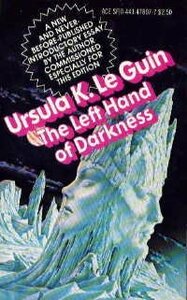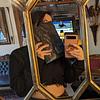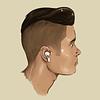Take a photo of a barcode or cover
A atmosfera criada por Ursula remete ao frio, à desolação, e a principal diferença entre os povos dá o pano de fundo social atrelado ao gênero. Bem construído e envolvente, com a parte final um pouco repetitiva, principalmente na parte do Gelo. Uma boa ficção e como toda boa ficção apresenta um paralelo questionador da nossa sociedade.
adventurous
hopeful
inspiring
medium-paced
Plot or Character Driven:
A mix
Strong character development:
Yes
Loveable characters:
Yes
Diverse cast of characters:
Yes
Flaws of characters a main focus:
Yes
I honestly think this book came to me at a bad time, and I plan on rereading it in the future.
This Sci-Fi book by one of my favorite Sci-Fi authors, Ursula K. Le Guin, is of course a masterclass in the genre. It heavily covers the topics of androgyny, sexuality, nationalism, propaganda, oppression, and hunger for power.
The story follows Genly, who at his core is an extremely flawed narrator who has obvious wrestles with sexism, among other issues. This I think is what made getting through this book hard for me at the moment, though was done artfully. As a traveler from another planet, even surrounded by completely androgynous individuals he struggles to not always see the "woman" in those around him, and often is put off when he does. The commentary here was well done, and in certain instances, it is heartbreaking to watch him hurt those around him because of these biases.
While this is a large theme, the political themes here hit home as well. From hatred taking over radio stations to blatant lies that can easily destroy the honor-bound people of this planet, you see the ugly of power-hungry nationalists and those around them.
As with any of Le Guin's writings, I highly recommend reading this. For me, I think The Dispossessed hit me harder in many ways, and would recommend that above this novel unless these themes are super interesting to you!
For me, this book goes back on the shelf until I am ready to wrestle with it and the themes in it a bit deeper and more intimately.
Quotes:
“It is a terrible thing, this kindess that human beings do not lose. Terrible, because when we are finally naked in the dark and cold, it is all we have. We who are so rich, so full of strength, we end up with that small change. We have nothing else to give. ”
“No, I don't mean love, when I say patriotism. I mean fear. The fear of the other. And its expressions are political, not poetical: hate, rivalry, aggression.”
“But it doesn't take a thousand men to open a door, my lord."
"It might to keep it open.”
⭐⭐⭐.5 /5
This Sci-Fi book by one of my favorite Sci-Fi authors, Ursula K. Le Guin, is of course a masterclass in the genre. It heavily covers the topics of androgyny, sexuality, nationalism, propaganda, oppression, and hunger for power.
The story follows Genly, who at his core is an extremely flawed narrator who has obvious wrestles with sexism, among other issues. This I think is what made getting through this book hard for me at the moment, though was done artfully. As a traveler from another planet, even surrounded by completely androgynous individuals he struggles to not always see the "woman" in those around him, and often is put off when he does. The commentary here was well done, and in certain instances, it is heartbreaking to watch him hurt those around him because of these biases.
While this is a large theme, the political themes here hit home as well. From hatred taking over radio stations to blatant lies that can easily destroy the honor-bound people of this planet, you see the ugly of power-hungry nationalists and those around them.
As with any of Le Guin's writings, I highly recommend reading this. For me, I think The Dispossessed hit me harder in many ways, and would recommend that above this novel unless these themes are super interesting to you!
For me, this book goes back on the shelf until I am ready to wrestle with it and the themes in it a bit deeper and more intimately.
Quotes:
“It is a terrible thing, this kindess that human beings do not lose. Terrible, because when we are finally naked in the dark and cold, it is all we have. We who are so rich, so full of strength, we end up with that small change. We have nothing else to give. ”
“No, I don't mean love, when I say patriotism. I mean fear. The fear of the other. And its expressions are political, not poetical: hate, rivalry, aggression.”
“But it doesn't take a thousand men to open a door, my lord."
"It might to keep it open.”
⭐⭐⭐.5 /5
Definitely not the sci fi I expected, but I will say I enjoyed it. It was very hard to read from the beginning it puts you way deep into the world and it took a while for me to understand what’s happening. Also note that it was written in the 60s. I was very surprised with the themes it dealt with because these seem very relevant now.
Basically you have a person from earth visiting a completely different world where people are not defined in the binary sex as humans from his world are. It was interesting to see how the protagonist dealt with internal casual sexism that he learned from earth and how that translated to the new world. I enjoyed also the folklore stories presented. In general though it’s not plot heavy. I will be reading more of hers to explore this insanely elaborate world in more depth.
Basically you have a person from earth visiting a completely different world where people are not defined in the binary sex as humans from his world are. It was interesting to see how the protagonist dealt with internal casual sexism that he learned from earth and how that translated to the new world. I enjoyed also the folklore stories presented. In general though it’s not plot heavy. I will be reading more of hers to explore this insanely elaborate world in more depth.
challenging
reflective
sad
slow-paced
Plot or Character Driven:
A mix
Strong character development:
Yes
Loveable characters:
Yes
Diverse cast of characters:
Yes
Flaws of characters a main focus:
Yes
This book hit me like a brick.
The beginning was a challenge for me and I struggled along page by page. I had weird dreams where I was trying to understand what I was reading and understand what the point was - why was it written?
I was shocked in the end when I not only knew, but felt the why. I understood it in a whole way that I haven't felt in a very very long time. And I feel like I am a different person now than I was when I went in.
The beginning was a challenge for me and I struggled along page by page. I had weird dreams where I was trying to understand what I was reading and understand what the point was - why was it written?
I was shocked in the end when I not only knew, but felt the why. I understood it in a whole way that I haven't felt in a very very long time. And I feel like I am a different person now than I was when I went in.
Graphic: Death, Slavery
Moderate: Animal death, Biphobia, Death, Misogyny, Slavery, Suicide, Torture, Violence, Police brutality, Acephobia/Arophobia, Pregnancy, War
adventurous
emotional
inspiring
reflective
sad
medium-paced
Plot or Character Driven:
Character
Strong character development:
Yes
Loveable characters:
Yes
Diverse cast of characters:
Yes
Flaws of characters a main focus:
Complicated
A rare well-written sci-fi novel. Very believable. I'm interested in reading about LeGuin + feminism; there were multiple derogatory statements about women but I'm not sure if they were the author's perspective or the narrator's.
challenging
emotional
reflective
slow-paced
Plot or Character Driven:
Character
Strong character development:
Yes
Loveable characters:
Complicated
Diverse cast of characters:
Yes
Flaws of characters a main focus:
No
This is more of a note/thought than a review, but something I found extremely interesting is that there were hardly any characters referenced to as women, but many who were referenced to as men. Despite this being set in a genderless society. Initially I found it odd, but the way Le Guin writes gender in this book quickly grew on me. It’s confusing and reluctant and noncommittal, and through that you get to experience how Genly Ai, the main character from a world with strong gender binaries, worked through and struggled with the full acknowledgment and acceptance of the fact that such a world can exist. Even as a person who is gender nonconforming, I found it challenging (in the best way) at times to understand the characters and to break the habit of casting them as men and women in my head. Reading this brings to the surface how deeply woven gender is into every aspect of our existence, for better worse, and offers an alternative set in the beautifully fierce world of Winter.
This book is good just for its commentary on gender alone, but it’s made even better through Le Guin’s world-building. Winter is a planet of cold, and Le Guin reminds the reader of that every step of the way. The languages spoken on the planet have extensive lexicons with dozens of words used exclusively to describe various forms of winter weather. Their summers max out at a sunny 30 degrees (Fahrenheit). The scriptures of their faiths speak of snow and winter’s darkness. There are no large nonhuman animals nor any that fly. In fact, even the human species itself is slightly smaller than those of earth. Beyond the culture of cold and snow, although that is a major component, Le Guin even built a new calendar, system of time, and as aforementioned, language. She could’ve easily just dropped her plot and commentary into an unrealistically similar civilization, as I’ve seen done in other books that mix sci fi and social studies, but Le Guin took the time to flesh out the details and convey them in a way that makes the reader want more.
And this is all without even mentioning the subtle but queer romantic subplot which is just <3 *chefs kiss* a lot left unspoken, but still pretty bold for being written in the 1950s/60s.
This book is good just for its commentary on gender alone, but it’s made even better through Le Guin’s world-building. Winter is a planet of cold, and Le Guin reminds the reader of that every step of the way. The languages spoken on the planet have extensive lexicons with dozens of words used exclusively to describe various forms of winter weather. Their summers max out at a sunny 30 degrees (Fahrenheit). The scriptures of their faiths speak of snow and winter’s darkness. There are no large nonhuman animals nor any that fly. In fact, even the human species itself is slightly smaller than those of earth. Beyond the culture of cold and snow, although that is a major component, Le Guin even built a new calendar, system of time, and as aforementioned, language. She could’ve easily just dropped her plot and commentary into an unrealistically similar civilization, as I’ve seen done in other books that mix sci fi and social studies, but Le Guin took the time to flesh out the details and convey them in a way that makes the reader want more.
And this is all without even mentioning the subtle but queer romantic subplot which is just <3 *chefs kiss* a lot left unspoken, but still pretty bold for being written in the 1950s/60s.




